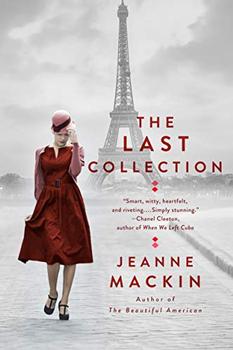Summary | Excerpt | Reading Guide | Reviews | Beyond the Book | Readalikes | Genres & Themes | Author Bio

Critics' Opinion:
Readers' Opinion:
First Published:
Jun 2019, 352 pages
Paperback:
Aug 2020, 368 pages
 Book Reviewed by:
Book Reviewed by:
BookBrowse First Impression Reviewers
Buy This Book
Part 1
Blue
Of the three primary colors, blue is most suggestive of paradox: it is the color of longing and sadness, and yet it is also the color of joy and fulfillment. On a ship, at night, blue water merges into blue sky, so blue is the color of places with no borders, no edges.
If you throw salt into a fire, the flames will burn blue. Salt rubbed into a wound renews the pain, intensifies it. Seeing others kiss and embrace was salt in my wound, a blue flame burning the length of me.
Blue best represents the contradictions of the heart, the need to be loved and cherished at the same time that we wish for freedom.
Blue, the color of the Worth gown that the little girl Elsa Schiaparelli found in her Roman piazza attic, the color of the covers of the penny romances Coco Chanel found in the orphanage attic.
Blue is what made Elsa Schiaparelli's daring color, shocking pink, so special: it is pink infused with blue, turning a demure blush into an electric surge. Schiaparelli turned girlish pink into the color of seduction by adding that touch of blue.
And always, there is the blue of the Paris sky on a June day.
Listen. I'm going to tell you a story about fashion, and politics. And of course, about love. The three primaries, like the primary colors.
New York, 1954
"For you." Liz, the gallery assistant, handed me the telegram. Pale blue paper, bold blue lettering. I turned it over and over in my hands. During the war we had learned to dread telegrams. The war was over and whoever was coming home was already there, but dread remained, the fear of again reading those words, "We regret to inform you ..."
"Aren't you going to open it?" she asked.
"Of course." I hesitated. The only people I loved, those still left to me, were just a few blocks away, downtown. No telegram would be needed, if something had happened to them; they were a local telephone call away. Open it, I ordered myself.
I sat on a packing crate and tore at the paper with my chipped fingernails, reminding myself that sometimes telegrams carried good news. It's possible.
The message was brief. Come to Paris. Need to see you. Signed, Schiap.
Elsa Schiaparelli. Of course she would send a telegram instead of making a transatlantic phone call. It wasn't the expense of the call but one of her many phobias and superstitions: she hated telephones. All the noise of the Madison Avenue gallery, the hammering, the whir of measuring tapes, the scraping of ladders being pushed across the floor, fell away. New York dissolved, and I was in Paris again.
I closed my eyes and remembered the accordion player on the corner of rue Saint-Honoré playing "Parlez-moi d'Amour," the throaty laugh of Schiap as she shared a bit of gossip with her assistant, Bettina. Usually, it had been gossip about Coco Chanel, her archrival. Charlie, handsome in his tuxedo, blond bombshell Ania turning heads in the Ritz bar. The taste of strong café, the smell of yeasty bread, the colors, the gleam of the Eiffel Tower, the medieval miracles of rose windows in the churches.
How long had it been? I'd been twenty-five when I met Schiap in Paris. She'd been forty-eight, only nine years older than I was now. And I had thought of her as old, though she never had. "Women don't age if their clothes stay new," she had told me once. "Grown women must never dress childishly, but neither should they accept age as inevitable. It is not, not in fashion."
After the war Schiap and I had gone separate ways, eager to get on with our lives, to return to what had been interrupted, to try to find what had been lost. Of course, there is no going back. Time is an arrow that flies forward, not back. I'd learned that particular lesson well. Too much looking over the shoulder turns you to salt, like Lot's wife, salt which burns blue.
Excerpted from The Last Collection by Jeanne Mackin. Copyright © 2019 by Jeanne Mackin. Excerpted by permission of Berkley Books. All rights reserved. No part of this excerpt may be reproduced or reprinted without permission in writing from the publisher.





The Flower Sisters
by Michelle Collins Anderson
From the new Fannie Flagg of the Ozarks, a richly-woven story of family, forgiveness, and reinvention.

The House on Biscayne Bay
by Chanel Cleeton
As death stalks a gothic mansion in Miami, the lives of two women intertwine as the past and present collide.

The Funeral Cryer by Wenyan Lu
Debut novelist Wenyan Lu brings us this witty yet profound story about one woman's midlife reawakening in contemporary rural China.
Your guide toexceptional books
BookBrowse seeks out and recommends the best in contemporary fiction and nonfiction—books that not only engage and entertain but also deepen our understanding of ourselves and the world around us.